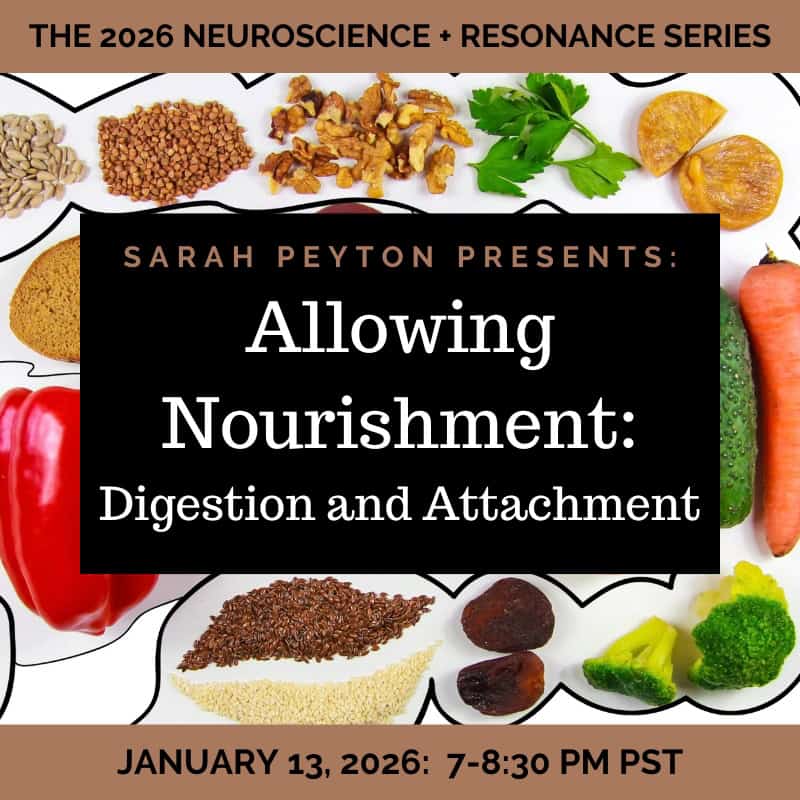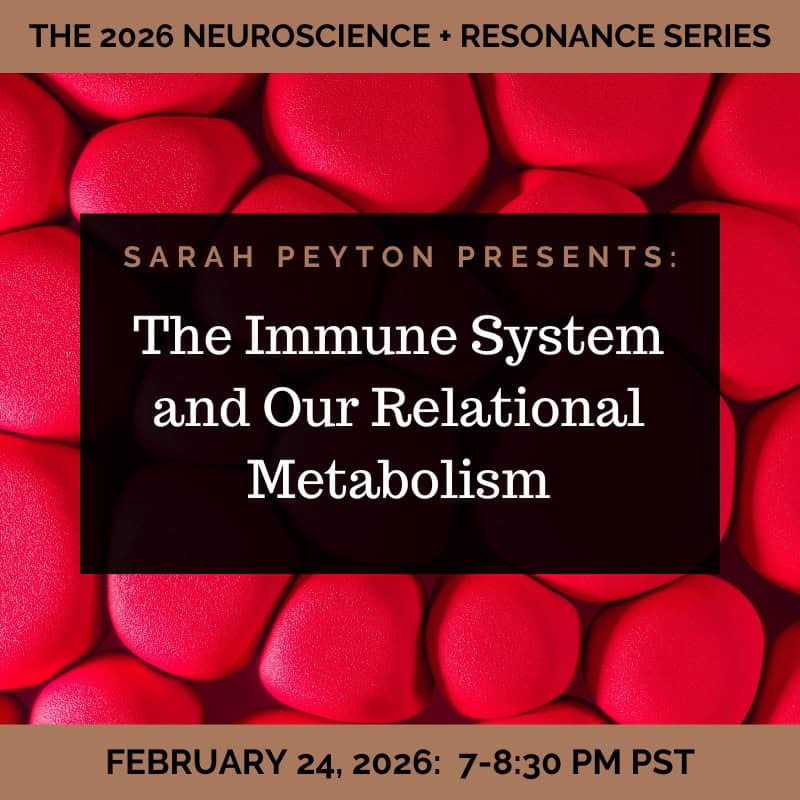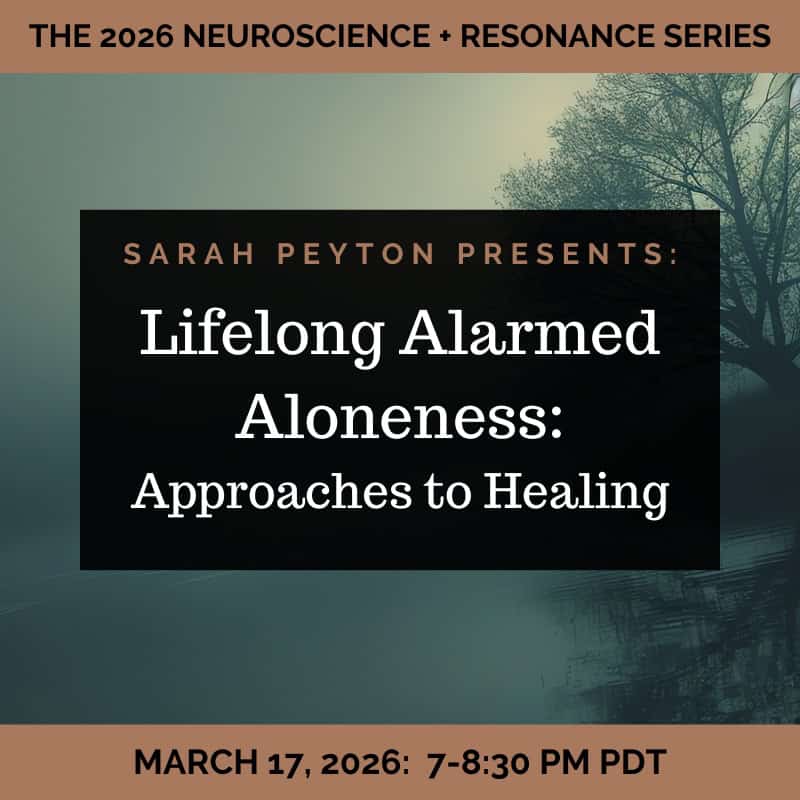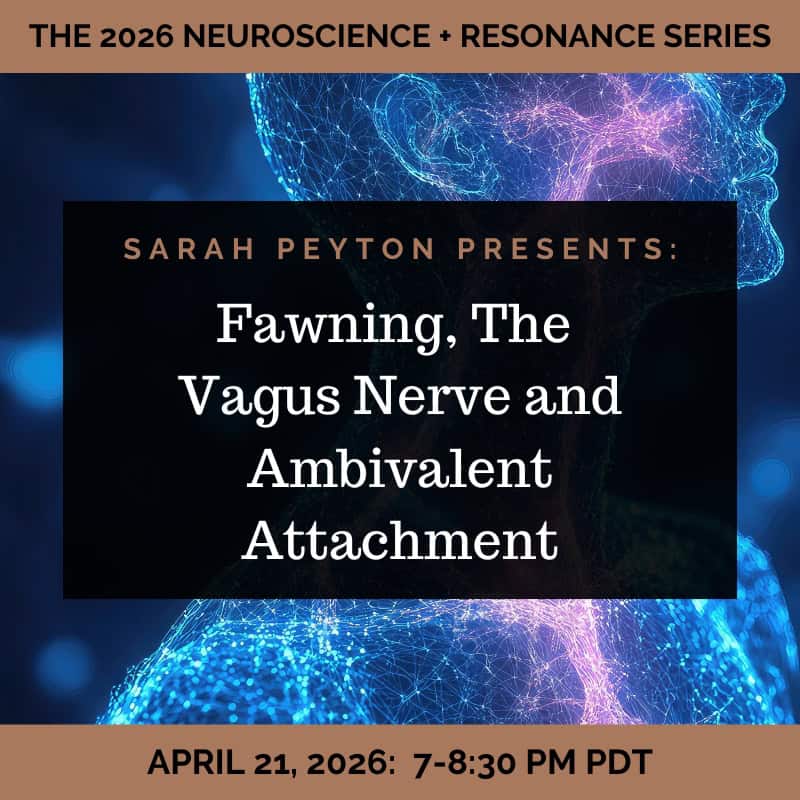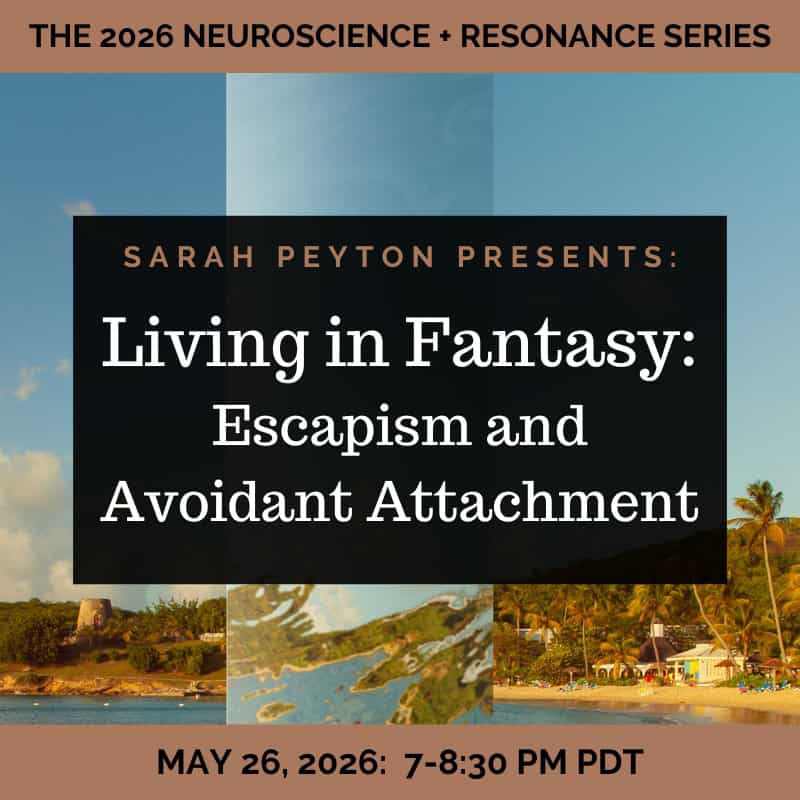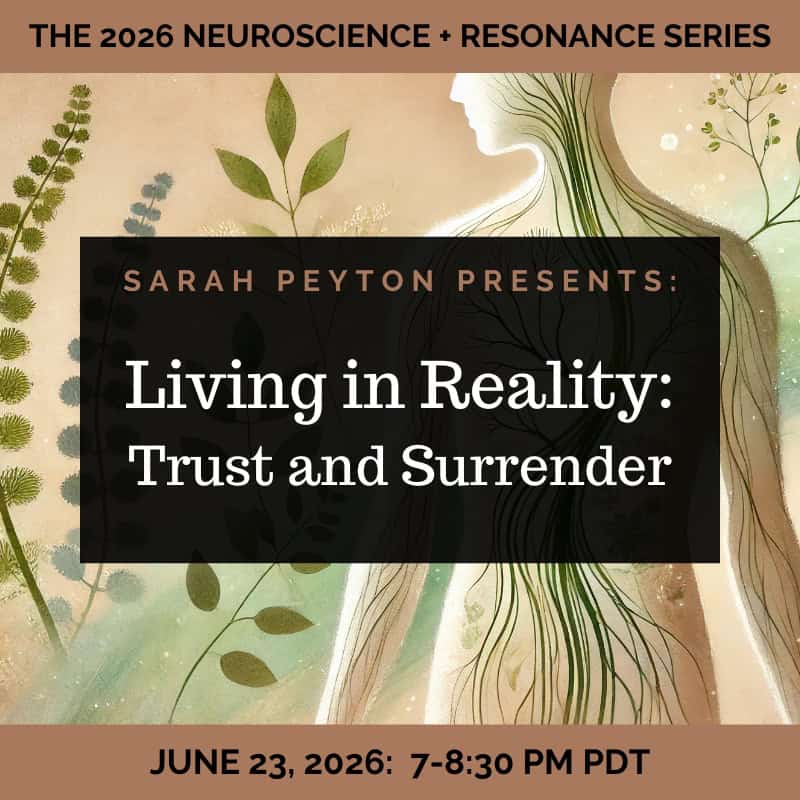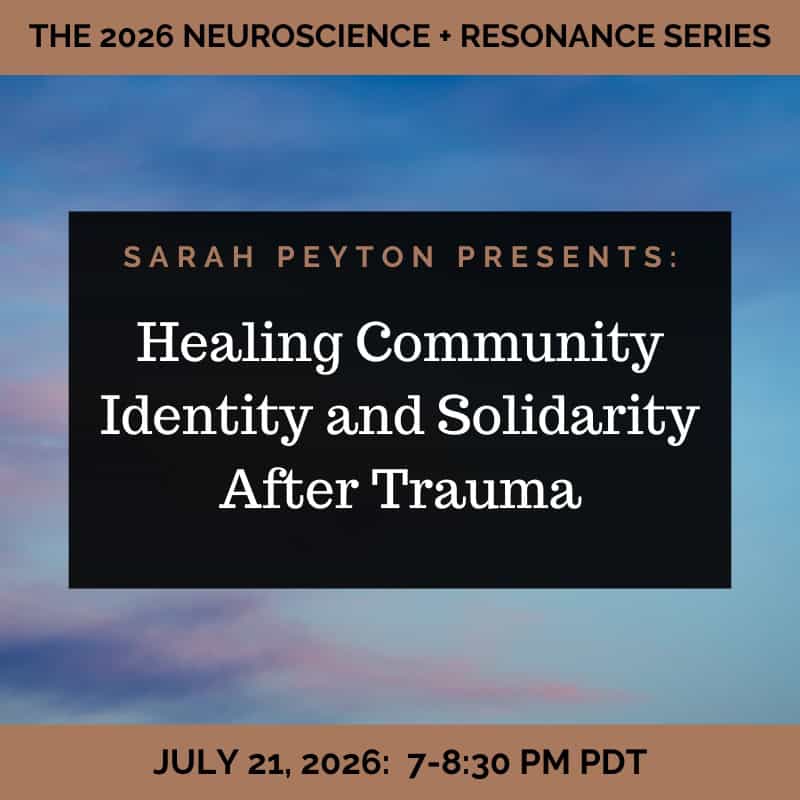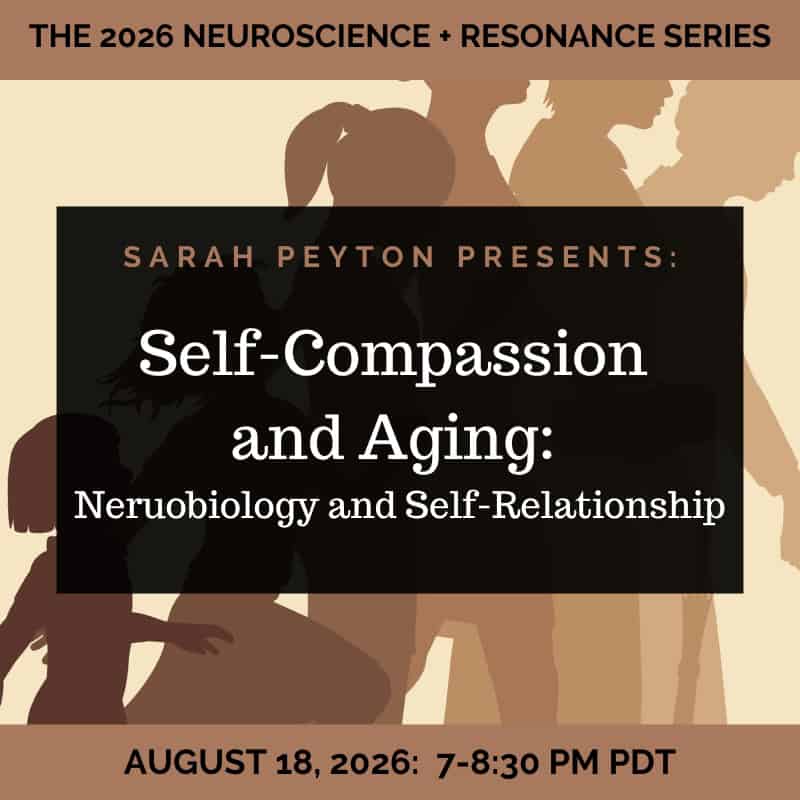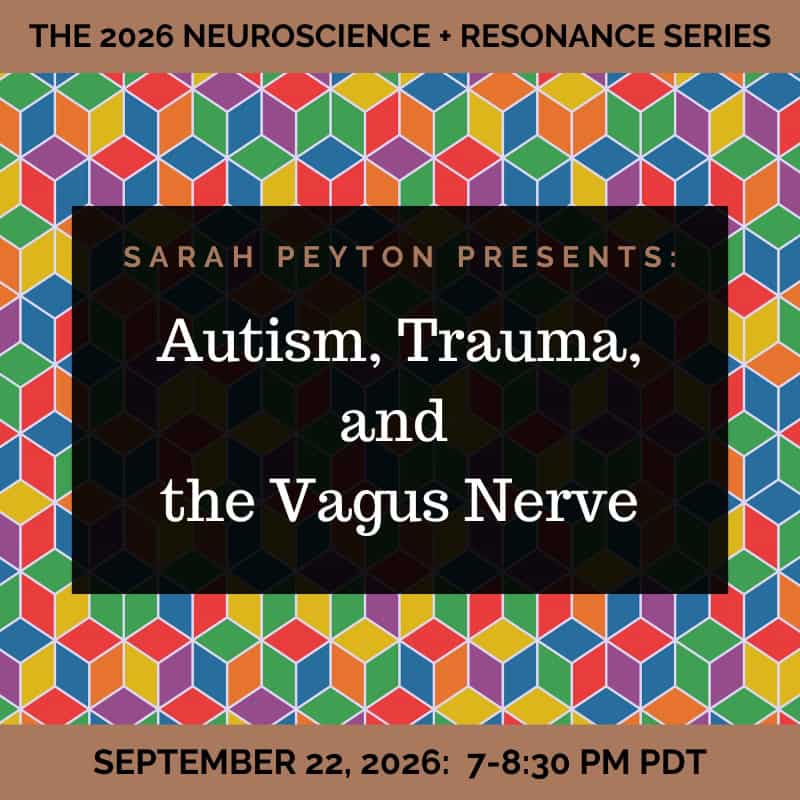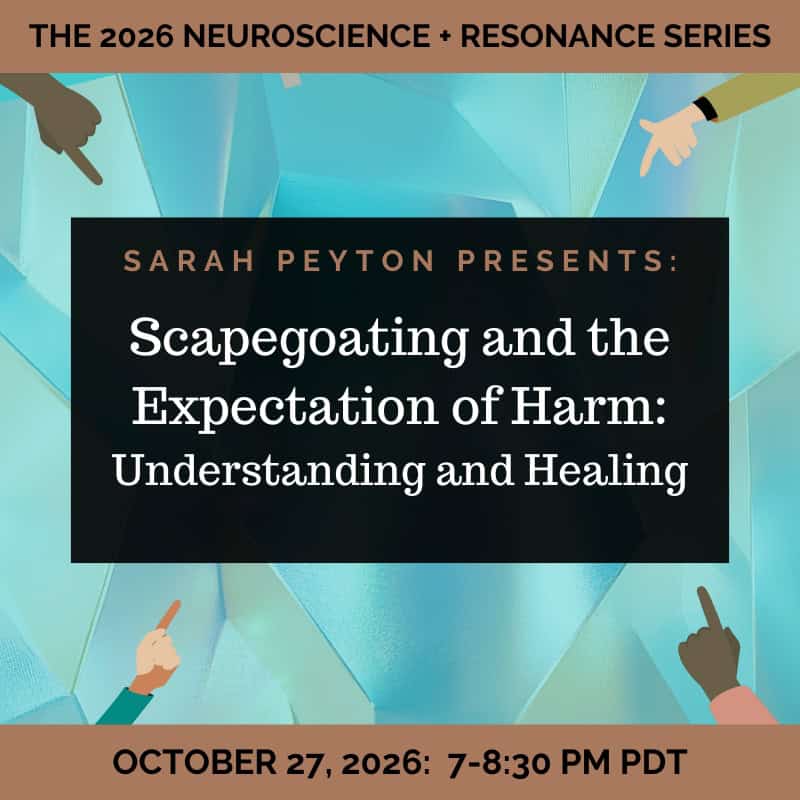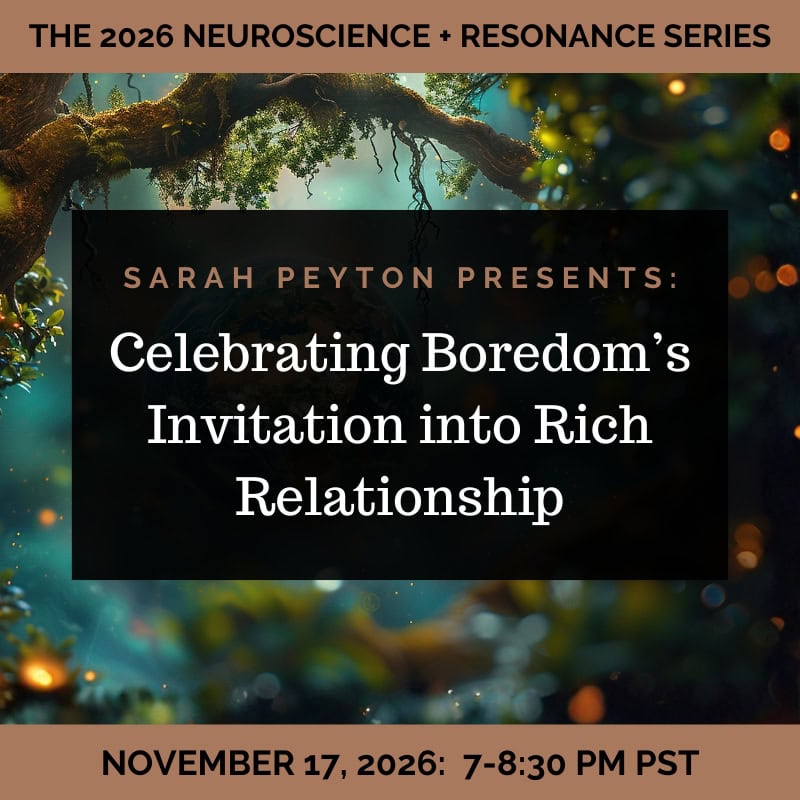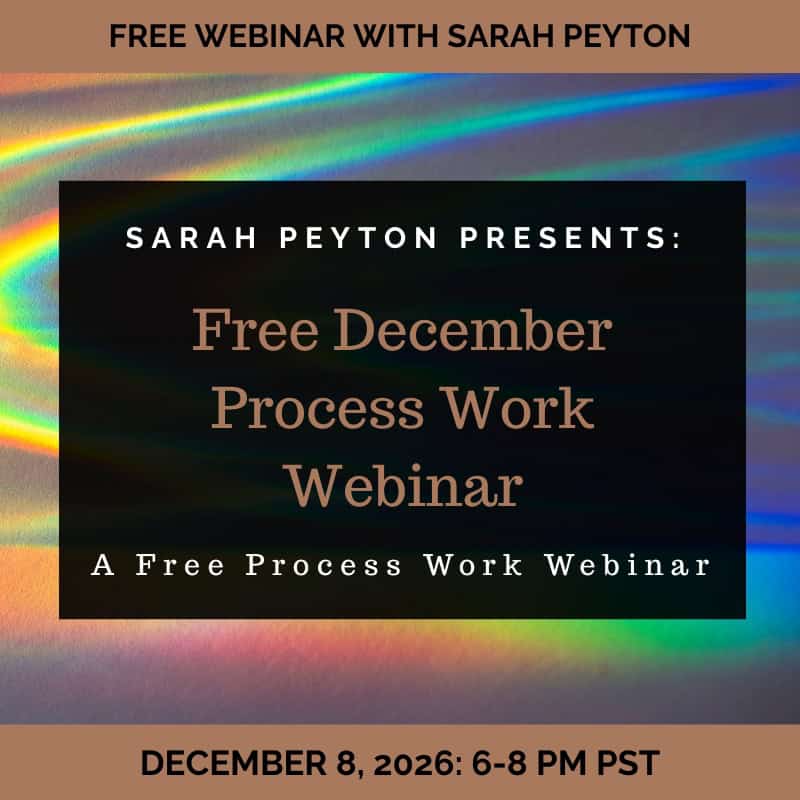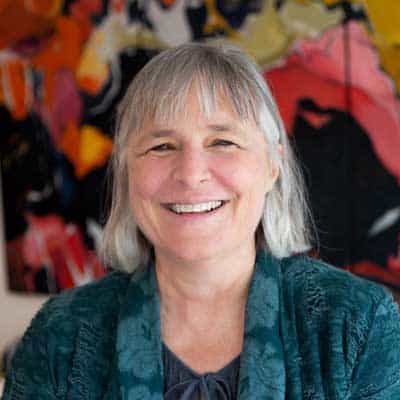sarah peyton presents
The 2026 Neuroscience and Resonance Monthly Webinar Series

January – December 2026
One Tuesday evening each month
7:00 PM-8:30 PM Pacific Time
January – December 2026
One Tuesday evening each month
7:00 PM-8:30 PM Pacific Time
Sarah’s guiding questions for this year’s research:
- How do we digest and metabolize what we are given in our lives?
- Where do we find nourishment?
- With resonance, how does our capacity to receive good things change, even in this difficult world?
Monthly Topics
Allowing Nourishment: Digestion and Attachment
What does it mean to be fed—not just with food, but with care, presence, and attunement? In the early kitchens of our lives, where relationships simmer alongside dinner plates, our capacity to receive nourishment is formed. Was it safe to be full? Or did hunger feel more familiar? We begin in the gut and the breath—where digestion, trauma, and attachment first root themselves. Here, we tune into the body’s quiet knowing. We bring our attention to the gut as a place of intuition and decision-making, where attachment lives not only in feelings but in enzymes, acids, the microbiome and the slow churn of digestion. Join Sarah Peyton for a journey into the intersections of nourishment, trust, and relational metabolism.
The Immune System and our Relational Metabolism
Our immune systems don’t just fight off germs—they remember experiences. They carry the imprints of betrayal and belonging, of safety and suspicion. In the ecology of our bodies, relationships leave residue: inflammation, changes and modifications to cells, and epigenetic movement. What patterns of protection and perception have become embedded in our tissue? What stories does your immune system carry from the relationships that shaped you? How does your body decide what is welcome, and what must be defended against, and how to prioritize its resources? What might it mean to allow nourishment again? Join Sarah Peyton for an exploration of the biology of boundaries and the tender intelligence of our inner defenders.
Lifelong Alarmed Aloneness: Approaches to Healing
What happens when the people we needed most were not there? When early echoes of absence become background noise in our adult lives, shaping our sense of what connection even is? Alarmed aloneness is not just a moment; it’s a state that can settle in the bones. In this session, we look gently at the long arc of this pattern—the ways it shows up in our nervous system, and the surprising pathways toward soothing and repair. Join Sarah Peyton for a dive into the roots and routes of healing from chronic relational absence.
Fawning, the Vagus Nerve and Ambivalent Attachment
Have you ever smiled when your heart wanted to scream? Or said yes while your body whispered no? How have we twisted ourselves to stay close to love, even when it harmed us? Fawning is the survival song we learn to sing when love feels conditional. This session will look at the dance between appeasement and attachment, through the lens of the vagus nerve and its role in shaping our relational responses. What does your body remember about how to stay close? And what becomes possible when we can rewrite that script? We meet our strategies with tenderness—not to fix them, but to understand and appreciate their roots. Join Sarah Peyton for an inquiry into fawning, nervous system intelligence, and the longings underneath compliance.
Living in Fantasy: Escapism and Avoidant Attachment
When reality feels too sharp to touch, fantasy becomes a balm. Avoidant attachment is not coldness—it is a sanctuary constructed from longing and protective distance. In this session, we explore the castles we build in the air and the roots we long to grow in the earth. What relationships taught us to expect too little? How does the nervous system pull away before it even knows it’s done so? What becomes possible when we see our survival strategies not as pathology, but as creativity born under pressure? Join Sarah Peyton in a gentle unmasking of avoidance as both an ache and a strategy, and a tender invitation back to presence.
Living in Reality: Trust and Surrender
What does it take to soften into the now? To meet another person without armoring or fantasy, without scanning for danger or rehearsing disappointment? Living in reality is a brave act—a dance with trust, and a flirtation with surrender. In this session, we explore what happens when we let go of the roles we learned to play and listen instead for what the moment invites. Join Sarah Peyton for a look at reality as a relational space, alive with the potential for new nervous system patterns and deepened trust.
Healing Community Identity and Solidarity after Trauma
When trauma, whether its natural disaster or violence caused by humans, slices through a group, what’s left in its wake? Sometimes numbness, shock and silence. Sometimes shame. Sometimes we act out with violence against the people we love the most. This session invites us into the collective healing of identity—what it means to be part of something larger than ourselves, after rupture. How do we mourn what was lost? How do we listen to each other’s pain without collapsing or competing? Join Sarah Peyton for a journey into the relational fields of community, trauma, and the slow rebuilding of trust through solidarity.
Self-Compassion and Aging: Neurobiology and Self-Relationship
As time paints lines on our faces and slows our steps, how does our inner dialogue age with us? Is your self-relationship one of kindness, or criticism? In the aging nervous system, compassion is not a luxury. Compassion is medicine. This session reviews how the brain and body evolve with age, and how our unconscious contracts suspend us in judgment against ourselves. Join Sarah Peyton to reflect on what it means to grow older in relationship with oneself. We invite warmth, curiosity, and the possibility of rewiring old loops into new tenderness.
Autism, Trauma and the Vagus Nerve
What happens when the world feels fundamentally unsafe, whether it is too loud, too fast, or too much? For all of us, the vagus nerve plays a crucial role in the processing of social and sensory input. Both autism and trauma can complicate this further, layering distress upon difference. This session gently explores the intersection of autism, trauma, and the body’s relational wiring. How can we support nervous systems that need something different from the world? Join Sarah Peyton for a session grounded in neuroscience, resonance, and the celebration of diverse relational rhythms.
Scapegoating and the Expectation of Harm: Understanding and Healing
What happens when the body expects to be blamed? To be the one left out, called out, or cast aside? Scapegoating is a relational wound that leaves deep grooves in the nervous system, teaching us to anticipate harm before it arrives. This session explores the origins of that wound—and the gentle, courageous work of healing it. What does your body believe about your place in the group? And what becomes possible when we interrupt the story that harm is inevitable? Join Sarah Peyton for a compassionate exploration of scapegoating, belonging, and repair.
Celebrating Boredom’s Invitation into Rich Relationship
Do you ever long to have friends and partners be really interested in you? Do you love it when they can follow along with you and ask two, even three questions in a row about what you are experiencing? When we really matter to ourselves, and our anxieties start to fade, we begin to notice when we are relationally bored, and a new awareness can emerge into a subtle noticing of the quiet textures of our relationships. This session invites us to explore boredom as a signal, and to make new efforts and requests, and to be drawn toward new sorts of relationships. Are we being met with curiosity? Are we extending it in return? What happens when we turn toward our partners or friends not from fear, but from genuine presence? Join Sarah Peyton for a deep dive into the heart of relational boredom, and the possibility it holds for richer, more attuned connection.
Register for the Full Series
Webinar Bundle: The 2026 Monthly Neuroscience and Resonance Webinar Series
$180.00
*PLEASE NOTE:
- Your tuition payment is non-refundable (but it is transferable).
- The webinars will be recorded for those who want to learn asynchronously for some or all sessions.
- These are primarily learning and neuroscience content webinars, including a small number of actionable insights and healing process work.
About the Instructor
Sarah Peyton, Certified Trainer of Nonviolent Communication and neuroscience educator, integrates brain science and the use of resonant language to heal personal and collective trauma with exquisite gentleness.
Sarah is a sought-after expert who brings neuroscience expertise together with depth work, self-compassion, and the transformative potential of language. She works with audiences internationally to create a compassionate understanding of the effects of relational trauma on the brain, and teaches people how words change and heal us.
Sarah teaches and lectures internationally and is the author of four books on relational neuroscience and self-compassion: Your Resonant Self: Guided Meditations and Exercises to Engage Your Brain’s Capacity for Healing, the companion Your Resonant Self Workbook: From Self-sabotage to Self-care, and Affirmations for Turbulent Times: Resonant Words to Soothe Body and Mind, and The Antiracist Heart: A Self-Compassion and Activism Handbook, co-authored alongside Roxy Manning, PhD.

